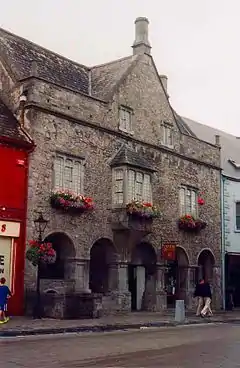William FitzJohn
William Fitzjohn (died 15 September 1326) was a leading prelate in early fourteenth century Ireland. He held the offices of Bishop of Ossory, Archbishop of Cashel, and Lord Chancellor of Ireland. He is chiefly remembered now for building the town walls of Cashel.
Early career

He is variously said to have been born in England or in Kilkenny, but little is known of his life before 1300. He first appeared in Ireland as a Canon of St. Canice's Cathedral, Kilkenny. Some sources name him William Fitzjohn Rothe: it has been suggested that he was related to the prominent Rothe family of Rothe House, Kilkenny. In 1302 the see of Ossory became vacant and Fitzjohn, who was much loved by the clergy of the diocese, was their unanimous choice as Bishop of Ossory.[1]
Archbishop of Cashel
In 1317 the Archbishopric of Cashel became vacant, causing a fierce contest between three rival candidates. Pope John XXII refused to appoint any of them and chose Fitzjohn instead; although King Edward II had his own preferred candidate, he happily accepted Fitzjohn, whom he knew and respected.[2] The Archbishop served as Lord Chancellor of Ireland between 1318 and 1320, and briefly as Lord Deputy of Ireland in 1318.[3]

Later life
As Archbishop he is mainly remembered today for overseeing the building of the walls of Cashel town.[4] The archdiocese suffered greatly during the Bruce campaign in Ireland in 1315-1318 and Fitzjohn found himself in severe financial difficulty as a result. In 1320 the King wrote to the Pope asking for the Archbishop to be released from paying certain debts, on account of the invasion : "he has not received the least profits out of his See, but was obliged to run into debt with his neighbours and friends even for necessaries." To assist Fitzjohn financially, the King appointed him Keeper of the Rolls,[5] with an income of £500 a year.
Character
Fitzjohn died on 15 September 1326. O'Flanagan[6] describes him as a man of great influence and power who was revered by the clergy and laity of his diocese. He was reputed to have accumulated great wealth, but this seems unlikely in view of the pleas of poverty made by King Edward to the Pope on his behalf, just six years before he died.
References
- O'Flanagan, J. Roderick The Lives of the Lord Chancellors of Ireland London 2 Volumes 1870
- O'Flanagan Lives of the Chancellors
- MacGeoghegan, James History of Ireland, Ancient and Modern Paris 1758 Vol. 2 p.265
- Cashel Public Realm Plan January 2008
- Ball F. Elrington The Judges in Ireland 1221-1921 John Murray London 1926
- Lives of the Chancellors